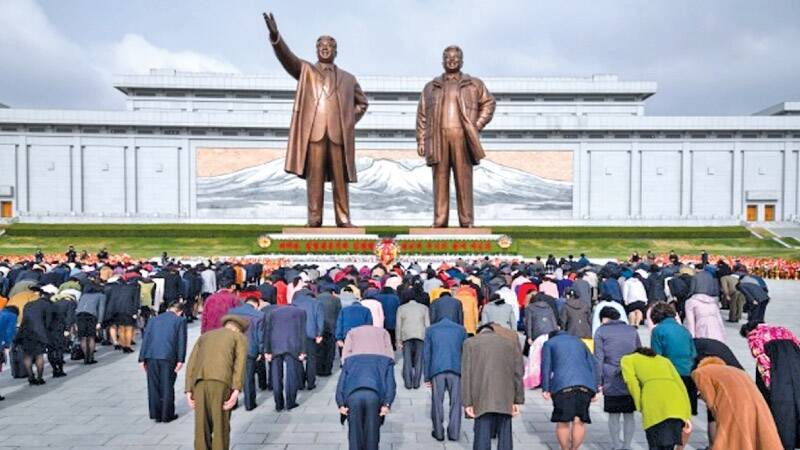North Korean people bowed to the bronze statue of Kim Il Sung and Kim Il Sung and his son at the "Mansudae Monument" in Pyongyang.
(AFP file photo)
[Compiled by Chen Chengliang/Comprehensive Report] The South Korean Ministry of Unification released the "2023 North Korean Human Rights Report" on March 30, exposing shocking cases of human rights abuses by the North Korean regime, including public executions, live experiments, infanticide, torture and rape. There are naked examples of human rights abuses such as humane punishment, and there is also a pregnant woman who was executed for pointing at North Korean father Kim Il Sung while dancing.
South Korea’s JoongAng Ilbo reported that after the enactment of the North Korean Human Rights Act in 2016, South Korea’s Ministry of Unification has released relevant reports every year since 2018, but this is the first time that the content of the report has been made public.
Previously, the South Korean government classified the report as a third-level secret and would not make it public due to concerns about the leakage of personal information of North Korean defectors and protests in Pyongyang.
Some analysts believe that the South Korean government is using human rights issues as an opportunity to increase pressure on North Korea as North Korea's nuclear threat becomes increasingly explicit.
Please read on...
Based on the testimonies of 508 North Korean defectors since 2017, the report introduces shocking examples of human rights abuses by the North Korean regime, ranging from public executions such as shootings, live experiments, infanticide, torture, and inhuman punishments. Examples include the daily monitoring of residents and the deprivation of freedom of expression and other harsh living conditions.
The report pointed out that "in North Korea, there is a phenomenon of arbitrary deprivation of life by the public power." ” stipulates that the death penalty should not be imposed, and those involved have also been executed.”
In particular, the "Reactionary Ideological and Cultural Exclusion Act" enacted by North Korea at the end of 2020 clearly stipulates that "the behavior of inflowing, watching and disseminating reactionary ideas can be punished by death."
In 2020, a man in Ryanggang Province was publicly shot for distributing a USB flash drive containing a large number of Korean dramas such as "Crash Landing on You".
In 2019, someone was sentenced to 4 years of hard labor for sharing the Korean drama "Descendants of the Sun" with acquaintances.
According to the testimonies of North Korean defectors, North Korea executes "mostly by tying the execution target to a pillar, and firing three rounds each at the head, chest, and legs, for a total of nine rounds."
There is also testimony that in 2018, a public execution was carried out by machine gun fire on the banks of the Soseongcheon River in Chongjin City, North Hamgyong Province.
In addition, the report also collected many cases of punishment for so-called "reactionary speech" against the Kim Jong-un regime.
In 2017, a short video of a woman dancing at home was circulated on the market. The image of her fingering Kim Il Sung's portrait in the action became a problem and she was publicly executed. The woman was 6 months pregnant at the time.
There are testimonies that North Korea conducts living experiments on people suffering from schizophrenia or mental retardation who cannot express themselves accurately in a hospital or management facility called "No. 83".
"In North Korea, the perception of people with disabilities is very negative, and even the very existence of people with disabilities is viewed as disgraceful," the report states.
The report also mentioned, "There are statements that North Korean authorities restrict the marriage and childbirth of disabled people and isolate them in 'dwarf villages.'"
The report also stated that North Korea executes and performs forced labor on detainees in political prison camps, and that prisoners of the national army, abductees and separated family members are also subject to surveillance and discrimination.
South Korean Unification Minister Kwon Ning-se said in his launch statement, "The report aims to allow the government to accurately grasp the human rights situation in North Korea and find substantive solutions."
An official from the Ministry of Unification explained on the same day that in order to truthfully reflect the recent human rights situation in North Korea, if there is a contrary testimony, it will also reflect the relevant situation and record it impartially.
